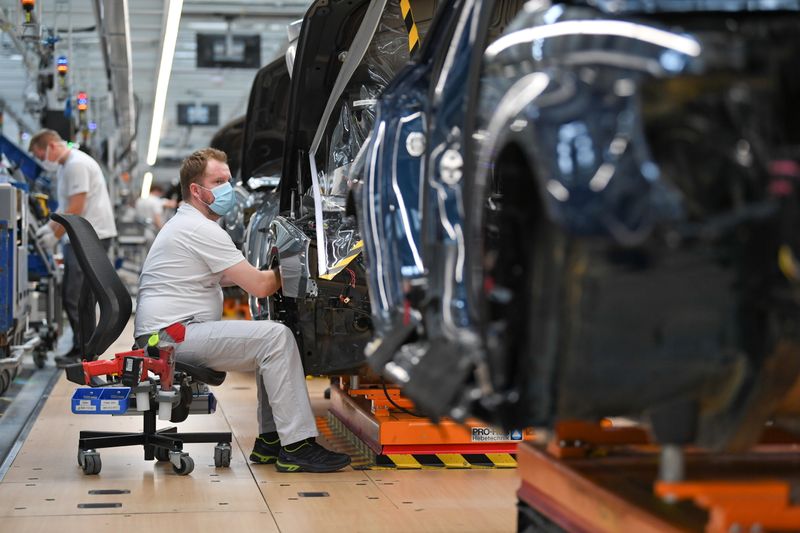FRANKFURT (Reuters) -Germany’s car industry is facing an “employment fiasco” unless it gets badly needed investment in new technologies, especially batteries, the country’s top labour leader said.
The warning came after a survey by the Ifo institute showed that the transition to electric vehicles (EVs) could cost the industry some 100,000 jobs in combustion engine production by 2025 if companies fail to beef up efforts to reskill workers.
“Whoever takes the view that the loss of jobs could be fully offset is creating false hopes,” Joerg Hofmann, president of IG Metall, Germany’s most powerful union, told Reuters.
As battery-powered cars need less assembly than combustion engine vehicles, the EV boom means carmakers and their suppliers must address the risks of unemployment due to skill mismatches by retraining employees.
IG Metall’s Hofmann said tens of thousands of jobs were at risk out of the 260,000 in Germany’s car industry that are directly tied to combustion engine technology.
“Even if there is investment in areas, for example battery technology, it is a huge challenge. But without investment and industrialisation in Germany we are facing an employment fiasco,” Hofmann said.
Germany now plans to cut carbon dioxide emissions by 65% by 2030, and the car industry is due to get tougher new CO2 targets, he said, adding that this would equate to 14 to 16 million EVs on German roads by the end of the decade, up from 7 to 10 million expected under previous emissions goals.
“We expect that at that stage at least two out of three new cars will be fully electric or hybrid. And every additional electric car is one combustion engine-based vehicle less.”
Ifo President Clemens Fuest said the transition to e-mobility was posing a major challenge, especially for the hundreds of small, highly specialised suppliers.
It was key to develop highly qualified jobs in the remaining combustion engine industry and the nascent e-car sector without stopping structural change, he said.
The expected shifts in employment will not be fully absorbed by the retirement of baby boomers, the survey by the Ifo Institute for Economic Research showed.
It estimated that at least 175,000 car jobs would be at risk by 2025 and only 73,000 workers in combustion engine production would have retired by then. That meant about 100,000 workers could face unemployment if they don’t obtain new skills.
The Ifo survey, which was commissioned by the German VDA car association, did not take into account the potential creation of new jobs in EV manufacturing or battery cell production.
(Reporting by Ilona Wissenbach and Jan Schwartz; Additional reporting by Christoph Steitz and Michael Nienaber; Editing by Riham Alkousaa, Elaine Hardcastle and David Clarke)

























